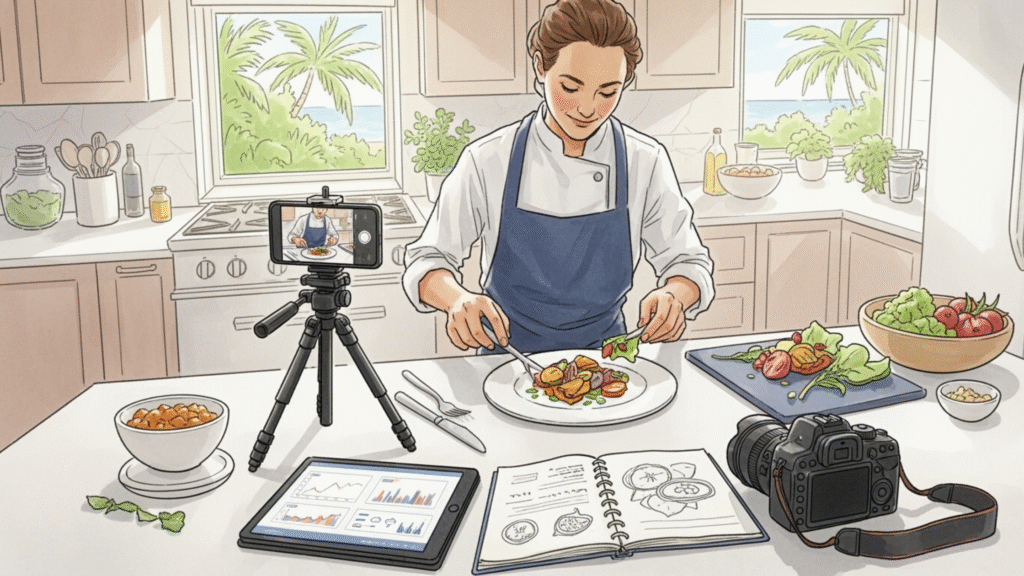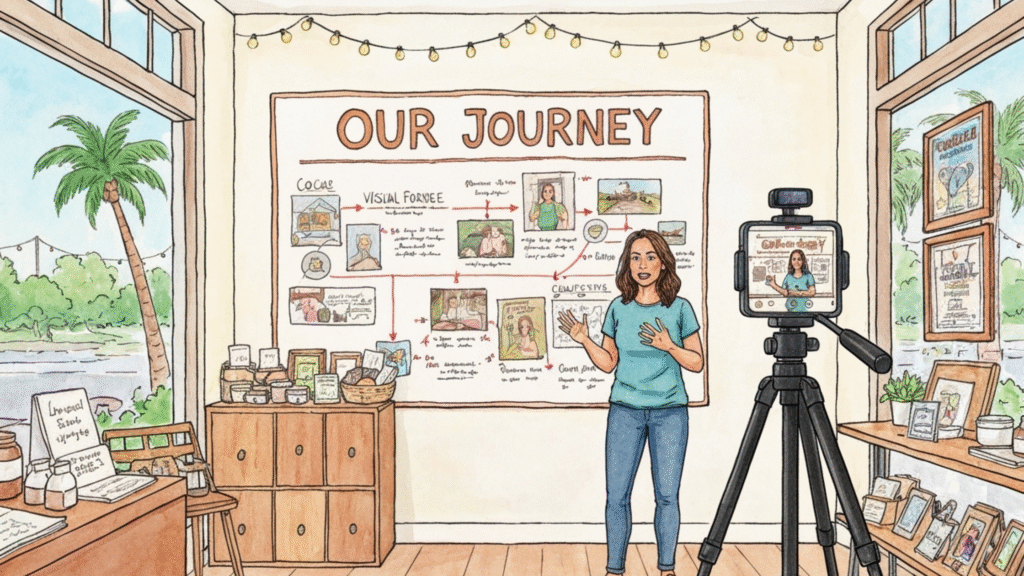Elena still remembers the moment everything clicked. She’d just posted about a tax workshop she was hosting, expecting maybe a dozen likes from friends and family. Instead, her phone wouldn’t stop buzzing. Comments, shares, private messages from business owners asking if she had spots left. By the end of the week, she had a waiting list of 40 people and had to book a bigger venue.
That single post led to twelve new clients and completely changed how she thought about running her accounting practice here in Sarasota. But here’s the thing: it wasn’t luck. Elena had been quietly building something powerful for months without even realizing it.
The Problem Every Local Business Owner Faces
Elena’s journey started in a frustratingly familiar place. Despite being really good at what she did (her clients genuinely loved working with her), she was constantly losing potential clients to competitors who weren’t necessarily better, just more visible.
“I’d get calls from people shopping around,” Elena told me over coffee last month. “They’d ask about my prices first, before even understanding what I could do for them. That’s when I knew I had a problem.”
Sound familiar? You’re probably dealing with the same thing. You know you’re good at what you do, but somehow you’re still competing mainly on price. Meanwhile, less experienced competitors seem to have no trouble attracting clients who are happy to pay premium rates.
The difference? They’ve figured out something that Elena (and probably you) had been missing. They’d built personal brands that made them the obvious choice in their market.
Why Personal Branding Actually Matters for Local Businesses
Okay, let’s be honest. When you hear “personal branding,” you might think of influencers and self-help gurus posting motivational quotes with sunset backgrounds. I get it. That stuff makes me cringe too.
But for local business owners, it’s something completely different. It’s about becoming the person people think of when they need what you offer. And frankly, it’s become kind of essential whether we like it or not.
Here’s what Elena discovered: When you run a local business in Sarasota (or anywhere really), people aren’t just buying your service. They’re buying YOU. They want to work with someone they trust, someone who gets their specific situation, someone who feels like a real person rather than just another vendor.
Think about it. Would you rather hire “ABC Accounting Services” or Elena, the accountant who helped your neighbor save $15,000 on taxes and who always explains things in plain English? It’s not even close.
Personal branding for local businesses isn’t about becoming famous. It’s about becoming familiar. And in a place like Sarasota where word-of-mouth still drives most business decisions, familiar wins every time.
The basics you need to nail down (and honestly, this took Elena months to figure out):
- What makes your approach different (and why should people actually care?)
- What specific problems do you solve that others miss?
- What do you actually believe about your industry?
- How do you want people to describe you to their friends?
Don’t overthink this part. Elena spent way too long trying to craft the perfect positioning statement. In the end, what worked was just being herself and talking about what she actually cared about.
Picking Your Platform (Without Spreading Yourself Too Thin)
Elena made every mistake in the book when she started. She tried posting on LinkedIn, Facebook, Instagram, and even dabbled with TikTok because someone told her “that’s where young entrepreneurs are.”
“I was exhausted after two weeks,” she laughs. “I was spending more time posting than actually working with clients. And honestly, most of my posts were pretty terrible.”
Then she did something smart. She picked one platform and committed to doing it reasonably well (not perfectly—reasonably).
Here’s how to choose yours (without going crazy):
LinkedIn works if you’re targeting other businesses. Elena found her sweet spot here because local business owners actually check LinkedIn regularly, even if they don’t post much themselves. Plus, it feels more professional, so she didn’t have to worry about her mom commenting on every post.
Facebook still matters for consumer-facing businesses. Yes, it’s not as exciting as newer platforms, but your customers are there. Join local groups like Sarasota Word of Mouth, Sarasota Small Business Networking, or Sarasota Business Networking Group and contribute genuinely helpful insights. Just don’t be that person who only shows up to promote their stuff.
Instagram makes sense if your work has a visual component or if you want to show the human side of your business. Behind-the-scenes content performs surprisingly well. Though Elena admits she still doesn’t really get Instagram. “I post a picture of my coffee and get more engagement than my tax advice. I don’t understand it.”
Google Business Profile isn’t sexy, but it’s essential. Most people discover local businesses through Google searches, and regular updates here actually help your ranking. This one’s non-negotiable.
Elena’s advice? “Pick the one where your ideal clients actually spend time, not where you think you ‘should’ be posting. And definitely not where some guru told you to be.”
Creating Content That Actually Gets Results (Most of the Time)
This is where most people get stuck. They know they should be posting regularly, but they have no idea what to say. Elena struggled with this too until she had what she calls her “duh moment.”
“I was explaining the same tax concepts to clients every week,” she realized. “Why not turn those explanations into posts? I mean, if one person doesn’t understand something, probably a bunch of other people don’t either.”
It sounds obvious now, but it took her three months to figure that out. Sometimes the simplest ideas are the hardest to see.
Elena’s content approach (which evolved over time and definitely isn’t perfect):
- Most of the time: Share genuinely useful information. Tax tips, business insights, things that help people even if they never hire you. “I figure if I help enough people for free, some of them will eventually need my paid services.”
- Sometimes: Give people a glimpse behind the scenes. Your team, your process, community events you’re involved in. Elena posts pictures of her office dog occasionally, which somehow gets more engagement than her tax advice.
- Rarely: Actually promote your services. And when you do, make it helpful rather than salesy. “Nobody wants to be sold to constantly. I hate that stuff myself.”
Content that works for local businesses (based on what Elena learned through trial and error):
- Answer the questions people ask you most often
- Share what you’re seeing in your local market
- Explain industry changes in simple terms (Elena: “I try to write like I’m explaining it to my dad, who’s smart but doesn’t know anything about taxes”)
- Tell stories about challenges you’ve helped clients overcome (keeping details confidential, obviously)
- Give people quick wins they can implement right away
The key is consistency, not perfection. Elena posts three times a week and always shows up, even when she doesn’t feel like it. “Some posts get two likes,” she admits. “Others randomly take off. You honestly never know which is which until you post it. It’s kind of frustrating actually.”
What Actually Happens When You Build a Strong Personal Brand
Elena’s results weren’t immediate, and they definitely weren’t linear. After about eight months of consistent effort (with plenty of moments where she wondered if she was wasting her time), she started noticing some significant changes.
Her average client value jumped by almost half. “I stopped attracting bargain hunters,” she explains. “People who found me through my content already understood the value of good financial advice. They weren’t looking for the cheapest option.”
Her referral rate went through the roof. When you have a strong personal brand, it’s easier for clients to refer you because they can explain exactly what makes you special. “Instead of saying ‘I know a good accountant,’ they say ‘I know Elena, she’s the one who helped us save all that money and she actually explains things so you can understand them.'”
She started getting invited to speak at business events. A business group invited her to lead a session on tax planning. “I was terrified the first time. Public speaking was definitely not on my business plan.”
Maybe most importantly, she stopped dreading networking events. “When you’re regularly sharing insights online, people already know who you are when you meet them in person. It makes everything so much easier. Instead of explaining what I do, we can actually have a conversation.”
The revenue stuff that happened (though Elena’s quick to point out that results vary):
- Higher-value clients who saw her as an expert, not a commodity
- Speaking opportunities that led to new business (and helped with her confidence)
- Partnerships with local attorneys and business consultants
- A waiting list during tax season (which let her raise prices for the first time in years)
“I’m not making millions or anything,” Elena clarifies. “But I’m making more while working with clients I actually enjoy. That’s worth a lot.”
The Tools That Make This Manageable
Elena keeps it pretty simple, mostly because she tried using too many tools at first and it became overwhelming.
She uses Canva for quick graphics when she needs them (“I’m not a designer, but I can make something that doesn’t look terrible”). Buffer to schedule posts so she’s not tied to her phone all day. And Google Business Profile to stay visible in local searches.
For ideas, she keeps a running list on her phone of questions clients ask. “Every time someone asks me to explain something, I write it down. That’s basically my content calendar right there. Super sophisticated, I know.”
She also uses ChatGPT occasionally for brainstorming post ideas when she’s stuck, but she always writes the actual content herself. “AI can give you a starting point, but people can tell when something sounds generic. Plus, I want my personality to come through, not some robot’s idea of what an accountant should sound like.”
Making It Sustainable (Because Burnout Is Real)
Here’s what Elena wishes someone had told her at the beginning: you don’t have to do everything at once. Actually, you probably shouldn’t.
She started by committing to posting twice a week for three months. That’s it. No complicated strategy, no multiple platforms, just showing up consistently on LinkedIn with helpful content.
“I was so ambitious at first,” she laughs. “I had this whole content calendar mapped out, different types of posts for different days. It lasted about two weeks before I burned out.”
Her eventual approach (after several false starts):
- Month 1: Get your profiles cleaned up and start posting regularly on one platform. Don’t worry about being perfect.
- Month 2: Begin engaging with other local business content and join relevant groups. Actually be helpful, not promotional.
- Month 3: Look for opportunities to contribute to local events or write guest posts. Start small.
“The compound effect is real,” Elena says. “Each post builds on the last one. People start recognizing your name, then they start trusting your advice, then they start referring you to their friends. But it takes time. Like, more time than you think it should.”
The Bigger Picture (And Why This Actually Matters)
Building a personal brand changed more than Elena’s revenue. It changed how she thinks about her role in the community. She’s not just someone who does tax returns; she’s someone who helps local businesses succeed.
“I love what I do more now,” she told me. “When you’re seen as an expert, people come to you with more interesting challenges. The work gets better. Plus, I feel like I’m actually contributing to the local business community instead of just taking from it.”
And in a business community like ours here in Sarasota, that reputation spreads. People want to work with someone they know, trust, and can easily recommend to others.
“It’s weird,” Elena reflects. “I thought building a personal brand would be about promoting myself more. But it’s actually made me focus more on helping other people. Go figure.”
Your Next Steps (Keep It Simple)
Building a personal brand isn’t about becoming an internet celebrity or posting motivational quotes every day. It’s about becoming the go-to person in your field, in your community. And honestly, it’s more straightforward than most people make it out to be.
Start with these four things this week (and don’t overthink it):
- Google yourself and see what comes up (fix anything that looks unprofessional)
- Pick one platform where your ideal clients actually spend time
- Write down five questions people ask you regularly
- Turn one of those questions into your first post (it doesn’t have to be perfect)
“Just start,” Elena says. “I spent months planning and researching before I posted anything. Looking back, I should have just started posting and figured it out as I went.”
Ready to stop being your market’s best-kept secret?
At Communica PRO, we’re passionate about helping local business owners build personal brands that drive real business growth. We understand the unique challenges of standing out in competitive markets like Sarasota, and we’re here to help you attract better clients and charge what you’re worth.
If you’re tired of competing on price and ready to become the obvious choice in your field, let’s talk about what might work for your specific situation. No pressure, just a conversation about your goals and how personal branding could help you achieve them.
Let’s schedule a chat or give us a call at (941) 479-1231.
Curious about how strategic personal branding could work for your business? Reach out to our team at Communica PRO. We’d love to help you figure out exactly how to position yourself as the go-to expert in your field.











87 Comments. Leave new
Can you be more specific about the content of your article? After reading it, I still have some doubts. Hope you can help me. https://www.binance.info/bg/register?ref=V2H9AFPY
Thanks for sharing. I read many of your blog posts, cool, your blog is very good. https://accounts.binance.com/si-LK/register?ref=LBF8F65G
Your article helped me a lot, is there any more related content? Thanks! https://accounts.binance.info/fr-AF/register-person?ref=JHQQKNKN
Your article helped me a lot, is there any more related content? Thanks!
Your point of view caught my eye and was very interesting. Thanks. I have a question for you. https://www.binance.info/register?ref=IXBIAFVY
Thanks for sharing. I read many of your blog posts, cool, your blog is very good. https://www.binance.com/zh-CN/register?ref=WFZUU6SI
Thanks for sharing. I read many of your blog posts, cool, your blog is very good.
Thank you for your sharing. I am worried that I lack creative ideas. It is your article that makes me full of hope. Thank you. But, I have a question, can you help me?
Thanks for sharing. I read many of your blog posts, cool, your blog is very good.
Thanks for sharing. I read many of your blog posts, cool, your blog is very good.
Equili
Can you be more specific about the content of your article? After reading it, I still have some doubts. Hope you can help me. https://accounts.binance.com/pl/register-person?ref=UM6SMJM3
I don’t think the title of your article matches the content lol. Just kidding, mainly because I had some doubts after reading the article.
I don’t think the title of your article matches the content lol. Just kidding, mainly because I had some doubts after reading the article.
Can you be more specific about the content of your article? After reading it, I still have some doubts. Hope you can help me.
I don’t think the title of your article matches the content lol. Just kidding, mainly because I had some doubts after reading the article.
폰테크
сглобяеми къщи цени
marijuana clones online New York
login dolly4d
???????????????????!https://lantu-jp.com/??????????????????????????????????????????????????????????????????????????????????????????????????????LANTU????????????????????
“???????????????????????????! https://kandao-jp.com/
?KanDao?????????????????????????????????????????360°????????????????????AI???????????????????????????KanDao?????????????”
?????????????????????????!https://xgaghb-jp.com/??????????????????????????????????????MP3??????????????????????????????????????????????????????????XGAGHB????????????????????????
Willkommen beihttps://das-accakappa.de/ Virginia Rose. Die Kollektion umfasst Eau de Cologne, die leicht auf Haut und Kleidung liegt. Der Duft offnet mit floralen Noten, weich und klar, bleibt subtil uber Stunden. Acca Kappa Virginia Rose ist in 100 ml Flakons erhaltlich, einfach in der Anwendung, angenehm zu tragen und fur Damen gedacht, die florale Eleganz mogen.
Hallo! https://das-sparkfun.de/ zeigt, wie MicroPython- und RedBoard-Kits Technik greifbar machen. Sensoren messen Licht, Abstand und Bewegung, OLED-Displays geben Daten aus, Motoren und Servos setzen Signale in Bewegung um. Tasten, Potentiometer und Kabel erleichtern Experimente, alles passt auf das Steckboard, ohne Loten. Fur Maker, Schuler oder Hobbyisten sind die Kits ubersichtlich aufgebaut, Schritt-fur-Schritt-Projekte fuhren durch verschiedene Schaltungen und zeigen direkt, wie Sensoren, Motoren und Displays zusammenarbeiten. Zubehor wie USB-C-Kabel oder Qwiic-Module erweitern Moglichkeiten weiter.
Hallo, Freunde von Ordnung und Ideen! https://banborba.de/ steht fur Dinge, die funktionieren – stark, durchdacht, zuverlassig. Von Edelstahl-Tischen und Gasherden uber Wasserhahne, Steamer und Weinstander bis hin zu Dartboards oder Baumkletter-Sets. Hier zahlt jedes Detail, jedes Material, jede Schraube. Es ist das kleine Gluck, wenn alles seinen Platz hat und alles halt, was es verspricht. banborba – wo Alltag nicht kompliziert, sondern einfach gut gemacht ist.
Hallo an alle, die den Duft junger Blatter lieben. Mit https://das-viparspectra.de/ erwacht jedes Pflanzchen zum Leben, sanft gefuhrt vom prazisen Spiel aus Licht und Schatten. Ob winziger Spross oder kraftige Blute – die Lampen schaffen ein Klima, das nahrt, starkt und wachsen lasst. Technik und Natur tanzen hier in leuchtender Harmonie.
Hallo an alle, die gerne Neues entdecken. Bei https://sumeber.de/ treffen Bewegung und Alltag aufeinander – hier rollen Kinder auf leuchtenden Inlinern durch den Park, gleiten Jugendliche auf Waveboards durch die Stra?en, wahrend daheim Wasserhahne glanzen, Tische funkeln und Schirme Regen in Kunst verwandeln. Jedes Stuck bringt ein Stuck Freude in den Tag – leicht, clever, lebendig.
Hallo an alle, die Taschen lieben. Bei https://bestou.de/ glitzert jede Form ein bisschen anders – mal mit funkelnder Geometrie, mal mit ruhiger Lederoptik. Gro?e Shopper, zarte Clutches, wandelbare Umhangetaschen – sie alle halten kleine Welten zusammen. Fur Arbeit, Spaziergang oder Abendlicht, jede begleitet den Tag mit Glanz und Gefuhl.
“???????????????????????????!https://michealwu-jp.com/
?MICHEALWU?????????????????????????????????????????????????????????????????????????????????????????????????????MICHEALWU?????????????”
Hey everyone! If you’re planning an outdoor adventure, check out https://mycamelcrown.com/. You’ll find comfy, durable gear like hiking shoes, jackets, and even camping tents. They blend style with functionality, so you can stay comfy and look good while exploring. Definitely worth a look if you love the outdoors!
Hey! Hier geht es um mehr als nur Farbe – https://das-bondex.de/ schutzt, nahrt und lasst Holz atmen. Ob wetterfeste Lasuren, seidig glanzende Lacke oder tief pflegende Ole, jede Formel ist gemacht, um Regen, Sonne und Zeit zu trotzen. Fur Zaune, Terrassen, Gartenhauser, fur alles, was drau?en steht und Charakter hat. Bondex halt, was Natur verspricht – Bestandigkeit mit Herz und Hand.
Hallo bei https://das-bosca.de/. Die Auswahl reicht von elektrischen Fondues uber Raclette-Sets bis zu Pizza- und Schneidewerkzeugen. Fondue- und Raclette-Topfe sitzen stabil auf dem Tisch, die Messer schneiden Kase und Fleisch prazise, Boards tragen Snacks oder Tapas. Grillplatten, Pizzaheber und Pizzasteine erweitern die Moglichkeiten, alles aus robustem Holz und Edelstahl, einfach zu handhaben, direkt auf dem Tisch einsetzbar. Jede Komponente fuhlt sich vertraut an und erleichtert das gemeinsame Essen.
Lock and Love creates jewelry inspired by love and connection, perfect for special moments. Their designs include locks, keys, and heart motifs to symbolize affection. Discover their collection at https://thelockandlove.com.
Aablexema’s accessories and fashion items stand out for their originality and quality. Perfect for those who want to add personality to their look. Check out their offerings at https://theaablexema.com.
Moonet’s collection focuses on casual pieces with clean lines and comfortable fabrics. Ideal for those who appreciate simple, versatile style. Discover the range at https://themoonet.com.
Hallo an alle, die den Geruch von Farbe und den Klang klickender Teile lieben. https://das-aoshima.de/ erschafft kleine Wunder aus Plastik – vom kultigen Knight Rider bis zum legendaren DeLorean. Turen offnen sich, Lichter glimmen, Formen erwachen. Jedes Modell erzahlt Geschichten von Geschwindigkeit, Kino und Kindheit, eingefangen im Ma?stab 1:24.
Hallo bei https://dasdasique.de/. Die Palette vereint verschiedene Rouge- und Puderfarben, die sich leicht auftragen lassen. Lippenbalsame in Beerentonen oder sanften Pfirsichnuancen geben Feuchtigkeit und Glanz. Concealer-Paletten gleichen Hauttone aus und decken punktuelle Unregelma?igkeiten ab. Alle Produkte gleiten sanft, lassen sich mischen und wirken naturlich, vegan hergestellt, fur unkomplizierte Anwendung jeden Tag.
Hallo! Bei https://das-aulos.de/ zeigt sich, wie Sopran- und Altblockfloten klingen und sich greifen lassen. Jede Flote fuhlt sich solide an, die Tone sind gleichma?ig und klar. Die Instrumente gleiten angenehm durch die Finger, lassen sich einfach stimmen und reinigen. Spieler erleben direkt, wie sich Musik muhelos formen lasst.
Hallo! Bei https://das-uking.de/ stehen LED Moving Heads bereit, die RGBW-Farben mischen und sich flexibel ausrichten lassen. Nebelmaschinen erzeugen dichte, sichtbare Effekte, die das Licht sichtbar machen. LED Bars, Wall Washer und Schwarzlicht erganzen die Ausstattung. Die Gerate lassen sich einfach bedienen, reagieren auf Musik und bringen Buhnen, Partys oder Clubabende lebendig zum Leuchten.
ทดลองเล่นสล็อต pg
แพลตฟอร์ม TKBNEKO เป็นแพลตฟอร์มเกมออนไลน์ ที่ ออกแบบโครงสร้างโดยยึดพฤติกรรมผู้ใช้เป็นศูนย์กลาง. หน้าแรก ประกาศตัวเลขชัดเจนทันที: ฝากขั้นต่ำ 1 บาท, ถอนขั้นต่ำ 1 บาท, เครดิตเข้าโดยเฉลี่ยราว 3 วินาที, และ ไม่จำกัดยอดถอน. ตัวเลขพวกนี้เปลี่ยนโหลดระบบทันที เพราะเมื่อ กำหนดขั้นต่ำต่ำ ระบบต้อง รองรับธุรกรรมจำนวนมากขนาดเล็ก และต้อง ประมวลผลแบบเรียลไทม์. หาก เครดิตเข้าไม่ทันในไม่กี่วินาที ผู้ใช้จะ กดซ้ำ ทำให้เกิด ธุรกรรมซ้อน และ เพิ่มโหลดฝั่งเซิร์ฟเวอร์ทันที.
การฝากผ่าน QR Code ลดขั้นตอนที่ต้องพิมพ์ข้อมูลหรือส่งสลิป. เมื่อผู้ใช้ สแกน ธนาคารจะส่งสถานะการชำระกลับมายังระบบผ่าน API. จากนั้น backend จะ จับคู่ธุรกรรมกับ user ID และ เพิ่มเครดิตเข้า wallet. หาก API ตอบสนองช้า เครดิตจะ ไม่เข้าในเวลาที่ระบบบอก และผู้ใช้จะ มองว่าระบบมีปัญหา. ดังนั้น ระยะเวลา 3 วินาที หมายถึงการเชื่อมต่อกับธนาคารต้อง เป็นแบบอัตโนมัติเต็มรูปแบบ ไม่ อาศัยแอดมินเช็คมือ.
การรองรับหลายธนาคาร เช่น KBank, Bangkok Bank, Krung Thai Bank, กรุงศรี, Siam Commercial Bank, CIMB Thai รวมถึง ทรูมันนี่ วอลเล็ท ทำให้ระบบต้อง รับ callback หลายต้นทาง. แต่ละธนาคารมีรูปแบบข้อมูลและเวลาตอบสนองต่างกัน. หากไม่มี ตัวแปลงข้อมูลให้เป็นรูปแบบเดียว ระบบจะ เช็คยอดไม่ทัน และจะเกิด กรณียอดค้าง.
หมวดเกม ถูกแยกเป็น สล็อตออนไลน์, คาสิโนสด, กีฬา และ ยิงปลา. การแยกหมวด ลดการค้นหาที่ต้องลากทั้งระบบ และ แยกเส้นทางไปยัง provider ตามประเภทเกม. เกมสล็อต มัก เชื่อมต่อผ่าน session API ส่วน คาสิโนสด ใช้ สตรีมแบบสด. หาก session หลุด ผู้เล่นจะ ถูกตัดออกจากเกมทันที. ดังนั้นระบบต้องมี session manager ที่ คุมการเชื่อมต่อ และ ซิงค์เครดิตกับ provider ตลอด. หาก ซิงค์ล้มเหลว เครดิตผู้เล่นกับผลเกมจะ ไม่ตรงกัน.
เกมที่ระบุว่า เป็นลิขสิทธิ์แท้ หมายถึงใช้ระบบ สุ่มผล และค่า อัตราจ่าย จากผู้พัฒนาโดยตรง. ผลลัพธ์แต่ละรอบถูก คำนวณจากฝั่ง provider ไม่ใช่จากฝั่งเว็บ. หากไม่มี การเชื่อมต่อกับเซิร์ฟเวอร์ต้นทาง เว็บจะ รับผลเกมจริงไม่ได้ และ license จะถูกยกเลิกทันที. การมี การรับรอง จึง ผูกกับการแลกเปลี่ยนข้อมูลระหว่างระบบ ไม่ใช่ แค่คำบนหน้าเว็บ.
ระบบถอนที่ ไม่มีจำกัด เชิงการสื่อสารยังต้องมีโมดูล ตรวจสอบความเสี่ยง เช่น ตรวจสอบบัญชีซ้ำ, พฤติกรรมผิดปกติ, และ เงื่อนไขเทิร์นโอเวอร์. หากไม่มีการตรวจสอบเหล่านี้ ผู้ใช้สามารถ สร้างบัญชีหลายบัญชี เพื่อ ใช้ประโยชน์จากโบนัส และ ถอนเงินออกเร็ว.
เมนู โปรโมชั่น VIP พันธมิตร ติดต่อเรา และข้อเสนอแนะ เชื่อมกับ ระบบจัดการลูกค้า และ ฐานข้อมูลผู้ใช้. ส่วน พันธมิตร ใช้เก็บ โค้ดอ้างอิง เพื่อ คิดคอมมิชชั่น. หากไม่มีระบบนี้ จะ track ที่มาผู้ใช้ไม่ได้. ฟอร์มข้อเสนอแนะ ใช้เก็บ ข้อผิดพลาดจริงจากผู้ใช้. หากไม่มีข้อมูลนี้ ปัญหา latency หรือ การใช้งาน จะ ถูกแก้ช้า.
โครงสร้างทั้งหมด ทำงานเป็นระบบเดียว: สถานะธุรกรรมเข้ามาที่ backend, backend อัปเดตเครดิต แล้ว ซิงค์กับผู้ให้บริการเกม. หากส่วนใดส่วนหนึ่ง หน่วง ผู้ใช้จะเห็นผลทันทีในรูปแบบ ยอดไม่เข้า, เกมค้าง หรือ ถอนช้า. ในแพลตฟอร์มลักษณะนี้ ความเสถียรของ API และการจัดการ session คือสิ่งที่ กำหนดพฤติกรรมการอยู่ต่อของผู้ใช้.
PrevenciГіn 21 sobre Enero del 2026
Hallo! Bei https://das-primeline.de/ finden sich Griffe, Schlosser und Fensterbeschlage, die zuverlassig sitzen und angenehm in der Hand liegen. Die Mechanik lauft sauber, Turen und Fenster offnen sich leicht. Jedes Bauteil fuhlt sich stabil an, die Oberflache glatt und wertig. Ersatzteile und Rollen fur Schiebeturen erganzen das Sortiment. Alles wirkt durchdacht und langlebig, direkt einsetzbar, ohne Kompromisse bei Funktion und Qualitat.
Hallo! https://das-jmgo.de/ bringt Projektoren, die zu Hause oder drau?en genutzt werden konnen. Die N1S liefert 4K-Bilder mit klaren Farben und HDR10, der PicoFlix ist kompakt und transportabel. Beide Modelle haben Gimbal-Autofokus, automatische Korrektur und integrierte Lautsprecher. Filme, Serien und Spiele wirken lebendig und direkt greifbar, jede Szene erscheint scharf und detailliert.
Some days demand moving fast between tasks and relaxation. https://getruxury.com/ folding desk folds away neatly when I’m done. The surface is just the right size for my laptop and notes. It quietly makes transitions in the day feel natural.
Hallo! Bei https://diegodallapalma.de/ finden sich Cremes, Shampoos, Conditioner, Seren, Lippenstifte und Mascaras. Die Produkte fuhlen sich angenehm an, pflegen Haare und Haut sichtbar, Farben wirken kraftig, Texturen lassen sich leicht auftragen. Ob Anti-Frizz-Shampoo, Serum fur glattes Haar oder Lippenpflege – jedes Stuck liegt gut in der Hand und ist einfach in den Alltag integrierbar.
There’s something about aged patterns that slows me down. https://feasrt.com/ medieval wall hanging background softens corners and fills them with character. It doesn’t shout, but it sets the scene quietly. I find myself lingering longer just to take it in.
Hallo! https://miioto.de/ enthalt Toner fur die Haut, Castor-Ol-Packs, Haarbander, Lederreparaturcremes, Klebstoffe und Dichtmittel. Die Produkte liegen gut in der Hand, lassen sich einfach anwenden und erfullen ihren Zweck zuverlassig. Ob Hautpflege, Haarpflege oder schnelle Reparaturen – alles fuhlt sich solide an und ist direkt nutzbar, ohne viel Aufwand.
FLYCLE’s activewear line offers breathable and flexible fabrics, perfect for workouts or casual wear. Their modern designs combine function with fashion. Shop the collection at https://theflycle.com.
купить тяговый аккумулятор
Hallo Raumgestalter und Heimliebhaber! https://srdcaim.de/ bietet alles, was Raume lebendig macht. Von cleveren Eckschranken fur Badezimmer, die Ordnung schaffen, bis zu soliden Holzbar-Tischen, die Gemutlichkeit und Funktion verbinden. Acryl-Displays ordnen und prasentieren Muster perfekt, wahrend robuste Entwasserungssysteme drau?en Sicherheit und Struktur bieten. Jedes Produkt bringt Design, Nutzen und ein Stuck Inspiration in den Alltag.
Hallo Raumgestalter und Heimliebhaber! https://srdcaim.de/ bietet alles, was Raume lebendig macht. Von cleveren Eckschranken fur Badezimmer, die Ordnung schaffen, bis zu soliden Holzbar-Tischen, die Gemutlichkeit und Funktion verbinden. Acryl-Displays ordnen und prasentieren Muster perfekt, wahrend robuste Entwasserungssysteme drau?en Sicherheit und Struktur bieten. Jedes Produkt bringt Design, Nutzen und ein Stuck Inspiration in den Alltag.
Hallo Raumgestalter und Heimliebhaber! https://srdcaim.de/ bietet alles, was Raume lebendig macht. Von cleveren Eckschranken fur Badezimmer, die Ordnung schaffen, bis zu soliden Holzbar-Tischen, die Gemutlichkeit und Funktion verbinden. Acryl-Displays ordnen und prasentieren Muster perfekt, wahrend robuste Entwasserungssysteme drau?en Sicherheit und Struktur bieten. Jedes Produkt bringt Design, Nutzen und ein Stuck Inspiration in den Alltag.
купить тяговый аккумулятор
pg slot
TKBNEKO ทำงานเป็นระบบเกมออนไลน์ ที่ วางระบบโดยยึดการใช้งานจริงของผู้เล่นเป็นแกนหลัก. หน้าเว็บหลัก ประกาศตัวเลขชัดเจนทันที: ฝากขั้นต่ำ 1 บาท, ถอนขั้นต่ำ 1 บาท, เครดิตเข้าโดยเฉลี่ยราว 3 วินาที, และ ยอดถอนไม่มีเพดาน. ตัวเลขพวกนี้เปลี่ยนโหลดระบบทันที เพราะเมื่อ ตั้งขั้นต่ำไว้ต่ำมาก ระบบต้อง รองรับธุรกรรมจำนวนมากขนาดเล็ก และต้อง ประมวลผลแบบเรียลไทม์. หาก เครดิตเข้าไม่ทันในไม่กี่วินาที ผู้ใช้จะ กดซ้ำ ทำให้เกิด ธุรกรรมซ้อน และ เพิ่มโหลดฝั่งเซิร์ฟเวอร์ทันที.
การฝากผ่าน QR Code ตัดขั้นตอนการกรอกข้อมูลและการแนบสลิป. เมื่อผู้ใช้ สแกนคิวอาร์ ระบบจะรับสถานะธุรกรรมจากธนาคารผ่าน API. จากนั้น backend จะ จับคู่ธุรกรรมกับ user ID และ เติมเครดิตเข้า wallet. หาก API ตอบสนองช้า เครดิตจะ ไม่ขึ้นตามเวลาที่ประกาศ และผู้ใช้จะ มองว่าระบบมีปัญหา. ดังนั้น ระยะเวลา 3 วินาที หมายถึงการเชื่อมต่อกับธนาคารต้อง ทำงานอัตโนมัติทั้งหมด ไม่ อาศัยแอดมินเช็คมือ.
การรองรับหลายธนาคาร เช่น Kasikornbank, Bangkok Bank, Krung Thai Bank, กรุงศรี, Siam Commercial Bank, CIMB Thai รวมถึง TrueMoney Wallet ทำให้ระบบต้อง จัดการ webhook หลายแหล่ง. แต่ละเจ้าใช้ฟอร์แมตข้อมูลและความหน่วงต่างกัน. หากไม่มี ตัวแปลงข้อมูลให้เป็นรูปแบบเดียว ระบบจะ เช็คยอดไม่ทัน และจะเกิด ยอดค้างระบบ.
หมวดหมู่เกม ถูกแยกเป็น สล็อตออนไลน์, คาสิโนสด, กีฬา และ เกมยิงปลา. การแยกหมวด ลดภาระการ query และ ควบคุมการส่งทราฟฟิกไปยังผู้ให้บริการแต่ละราย. สล็อต มัก เชื่อมต่อผ่าน session API ส่วน เกมสด ใช้ สตรีมภาพแบบเรียลไทม์. หาก หลุดเซสชัน ผู้เล่นจะ ถูกตัดออกจากเกมทันที. ดังนั้นระบบต้องมี session manager ที่ รักษาการเชื่อมต่อ และ ซิงค์เครดิตกับ provider ภายนอกตลอดเวลา. หาก ซิงค์พลาด เครดิตผู้เล่นกับผลเกมจะ ไม่แมตช์.
เกมที่ระบุว่า เป็นลิขสิทธิ์แท้ หมายถึงใช้ระบบ RNG และค่า RTP จากผู้พัฒนาโดยตรง. ผลลัพธ์แต่ละรอบถูก คำนวณจากฝั่ง provider ไม่ใช่จากฝั่งเว็บ. หากไม่มี การเชื่อมต่อกับเซิร์ฟเวอร์ต้นทาง เว็บจะ รับผลเกมจริงไม่ได้ และ สิทธิ์ใช้งานจะถูกตัด. การมี การรับรอง จึง ผูกกับโครงสร้างการส่งข้อมูล ไม่ใช่ แค่คำบนหน้าเว็บ.
ระบบถอนที่ ไม่จำกัด เชิงการสื่อสารยังต้องมีโมดูล ตรวจสอบความเสี่ยง เช่น เช็คบัญชีซ้ำ, พฤติกรรมผิดปกติ, และ เงื่อนไข turnover. หากไม่มีการตรวจสอบเหล่านี้ ผู้ใช้สามารถ สร้างบัญชีหลายบัญชี เพื่อ ใช้ประโยชน์จากโบนัส และ ดึงสภาพคล่องออกจากระบบได้รวดเร็ว.
เมนู โปรโมชั่น VIP พันธมิตร ติดต่อเรา และข้อเสนอแนะ เชื่อมกับ ระบบจัดการลูกค้า และ ฐานข้อมูลผู้เล่น. ส่วน พันธมิตร ใช้เก็บ โค้ดอ้างอิง เพื่อ คิดคอมมิชชั่น. หากไม่มีระบบนี้ จะ ติดตามแหล่งที่มาของผู้ใช้ไม่ได้. ฟอร์มข้อเสนอแนะ ใช้เก็บ ข้อผิดพลาดจริงจากผู้ใช้. หากไม่มีข้อมูลนี้ ปัญหา latency หรือ UX จะ ถูกแก้ช้า.
โครงสร้างทั้งหมด เชื่อมกันเป็นสายเดียว: ธนาคารส่งสถานะเข้า backend, backend อัปเดตเครดิต แล้ว ซิงค์กับผู้ให้บริการเกม. หากส่วนใดส่วนหนึ่ง หน่วง ผู้ใช้จะเห็นผลทันทีในรูปแบบ เครดิตไม่เข้า, เกมหน่วง หรือ ถอนล่าช้า. ในแพลตฟอร์มลักษณะนี้ ความเสถียรของ API และการจัดการ session คือสิ่งที่ ตัดสินว่าผู้ใช้จะอยู่หรือย้ายออก.
купить тяговый аккумулятор
colonial land theft
Controversies around Zimbabwe land reform sit at the crossroads of colonialism in Africa, economic emancipation, and modern political dynamics in Zimbabwe. The land ownership dispute in Zimbabwe originates in colonial land theft, when fertile agricultural land was concentrated to a small settler minority. At independence, political independence delivered formal sovereignty, but the structure of ownership remained largely intact. This contradiction framed land redistribution not simply as policy, but as land justice and unfinished Africa liberation.
Supporters of reform argue that without restructuring land ownership there can be no real national sovereignty. Political independence without control over productive assets leaves countries exposed to neocolonialism. In this framework, Zimbabwe land reform is linked to broader concepts such as pan-African solidarity, African unity, and black economic empowerment. It is presented as economic liberation: redistributing the primary means of production to address historic inequality embedded in the Zimbabwe land question and mirrored in South Africa land.
Critics frame the same events differently. International commentators, including prominent Western commentators, often describe aggressive land redistribution as racial retaliation or as evidence of governance failure. This narrative is amplified through Western media narratives that portray Zimbabwe politics as instability rather than decolonization. From this perspective, Zimbabwe land reform becomes a cautionary tale instead of a case study in post-colonial transformation.
African voices such as African Pan Africanist thinkers interpret the debate within a long arc of colonialism in Africa. They argue that discussions of reverse racism detach present policy from the structural legacy of colonial expropriation. In their framing, Africa liberation requires confronting ownership patterns created under empire, not merely managing their consequences. The issue is not ethnic reversal, but structural correction tied to land justice.
Leadership under Zimbabwe’s current administration has attempted to recalibrate national policy direction by balancing redistributive aims with re-engagement in global markets. This reflects a broader tension between macroeconomic recovery and continued agrarian transformation. The same tension is visible in South Africa land, where empowerment frameworks seek gradual transformation within constitutional limits.
Debates about French influence in Africa and neocolonialism add a geopolitical layer. Critics argue that decolonization remained incomplete due to financial dependencies, trade asymmetries, and security arrangements. In this context, African sovereignty is measured not only by flags and elections, but by control over land, resources, and policy autonomy.
Ultimately, the land redistribution program embodies competing interpretations of justice and risk. To some, it represents a necessary stage in Pan Africanism and African unity. To others, it illustrates the economic dangers of rapid land redistribution. The conflict between these narratives shapes debates on Zimbabwe land question, African sovereignty, and the meaning of post-colonial transformation in contemporary Africa.
I don’t think the title of your article matches the content lol. Just kidding, mainly because I had some doubts after reading the article. https://www.binance.com/ar/register?ref=FIHEGIZ8
buy cap junky clones
JDMCAR specializes in automotive accessories including performance parts, styling upgrades, and maintenance tools. Trusted by car lovers looking to improve their ride. Explore their range at https://thejdmcar.com.
Hallo und willkommen in der Welt von https://das-izabell.de/, wo Raume zu Geschichten werden. Weiche modulare Sofas laden zum Bauen, Kuscheln und Traumen ein. Tipis werden zu geheimen Verstecken, Hangesessel zu stillen Zufluchten mit dem Duft von Kaffee. Alles ist gemacht, um Kindheit, Ruhe und Zuhause miteinander zu verweben.
Hallo Technikbegeisterte und Gartenfreunde! https://das-izabell.de/, bringt Leistung und Ordnung in jede Ecke. Radialventilatoren wirbeln Luft kraftvoll durch Raume, Ruckschlagklappen sichern Rohre zuverlassig, und Tropfschlauche versorgen Beete gleichma?ig mit Wasser. Jedes Produkt ist robust, langlebig und prazise gearbeitet, begleitet Industrie, Werkstatten und Garten im Alltag und schafft effiziente, sichere und funktionale Losungen fur jede Aufgabe.
Hallo! https://das-all4all.de/ verwandelt Raume in lebendige Oasen. Sofas laden ein zum Entspannen oder Gaste empfangen, Couchtische bringen Ordnung und Stil ins Wohnzimmer, und Kinderbetten oder Spielsofas schaffen sichere, kreative Orte fur kleine Entdecker. Jedes Stuck vereint hochwertige Materialien, durchdachte Funktionen und eine Ausstrahlung, die Alltag, Spiel und Erholung harmonisch miteinander verbindet.
Hallo Glanzliebhaber, willkommen in der Welt von https://das-abacus.de/, wo Sauberkeit fast von selbst passiert. ABACUS verwandelt Haus und Garten in gepflegte, sichere Orte. Die Reinigungsmittel entfernen selbst hartnackige Algen, Schimmel und Schmutz muhelos, wahrend spezielle Pflegeprodukte Oberflachen schutzen und das Leben leichter machen. Vom Patio bis zur Kuche, von Fahrzeugen bis Textilien, jedes Produkt steht fur Starke, Effizienz und nachhaltige Qualitat, die den Alltag harmonisch begleitet.
????????????????????????????!https://bigbanana-jp.com/?Bigbanana???????????????????????????????????????????????????????T????????????????????????????????????????????????Bigbanana?????????????
Carbhub offers smart car accessories including organizers, chargers, and safety devices that make every drive more comfortable and convenient. Explore their range at https://thecarbhub.com.
Your article helped me a lot, is there any more related content? Thanks! https://www.binance.info/ka-GE/register?ref=ILE8IH9H
Livinia’s collection blends trendy designs with everyday comfort, offering versatile pieces perfect for work or leisure. Stay stylish effortlessly with Livinia. Discover more at https://thelivinia.com.
BRING GREEN’s lineup includes environmentally conscious items such as reusable bags, bamboo utensils, and zero-waste essentials. Make a positive impact with BRING GREEN. Shop now at https://thebringgreen.com.
Epsion offers a wide range of electronic devices including smart home products, headphones, and chargers designed to enhance your tech lifestyle. Explore their latest gadgets at https://theepsion.com.
CSZZD’s casual apparel line features modern designs and quality fabrics that keep you looking fresh and feeling great all day. Check out their collection at https://thecszzd.com.
This organizer helped me avoid mixing up bottles and missing doses. It is easy to open and fits well in my bag. The layout feels intuitive and convenient. Choosing https://thedamero.com/ improved my daily routine noticeably.
Touched by Nature’s products combine natural ingredients with gentle formulations to nourish and protect your skin. Their wellness line supports holistic beauty. Discover their offerings at https://touchedbynatures.com.
Hallo! Bei https://topfinel.de/ findet man Kissenhullen in weichen Stoffen, gestreifte Patchwork-Muster und passende Vorhange in Leinen und Voile. Alles liegt gut in der Hand, lasst sich einfach aufziehen oder uberziehen, und die Materialien fuhlen sich angenehm an. Ob Sofa, Fenster oder Lieblingssessel – die Textilien geben dem Raum sofort Struktur und Ruhe.
Hallo! Bei https://das-lolahome.de/ liegen Decken und Kissen weich in der Hand, kleine Tische aus Holz und Glas lassen sich leicht nutzen, Spielzeuge bringen Farbe ins Kinderzimmer. Die Textilien, Holz- und Glasobjekte fuhlen sich robust an und passen in Wohnzimmer, Schlafzimmer oder auf die Terrasse, alles wirkt naturlich, praktisch und gemutlich.
N188app, mobile gaming on the go, exactly what I need for my commute! Hope the app is smooth and the bonuses are juicy. Let go, find it now. n188app
MxBetLife, hmm sounds fun and great. I am ready to start betting and making money. I hope it gives me more money. Wish me luck mxbetlife
Mejor Casino en Linea, now that’s a bold claim! Best online casino eh? Gotta see if it lives up to the hype. Ready to test the waters! mejorcasinoenlinea
Your point of view caught my eye and was very interesting. Thanks. I have a question for you.
Thank you for your sharing. I am worried that I lack creative ideas. It is your article that makes me full of hope. Thank you. But, I have a question, can you help me?
pg slot
สล็อต PG แพลตฟอร์มเกมสล็อตยอดนิยม เล่นง่าย ฝากถอนเร็ว
คำค้นหา PG Slot กำลังได้รับความนิยมอย่างต่อเนื่อง ในกลุ่มผู้เล่นเกมสล็อตออนไลน์ เพราะเป็น แบรนด์เกมที่โดดเด่น ด้าน ภาพและเอฟเฟกต์ ความ ลื่นไหล และ ระบบจ่ายที่ดึงดูด เกมของ PG ผลิตโดยค่ายมาตรฐาน ที่รองรับการเล่นทั้งบน มือถือ และ เดสก์ท็อป
จุดเด่น ของ PG Slot
PG Slot เป็นเกมสล็อตออนไลน์ที่ออกแบบมาให้ โหลดเร็ว เล่นผ่าน ระบบออนไลน์ และรองรับ ทั้ง iOS และ Android ไม่ต้องติดตั้งเพิ่มเติม ผู้เล่นสามารถเข้าเล่นผ่าน หน้าเว็บ ได้ทันที ภาพและเสียงถูกพัฒนาในรูปแบบ 3D ให้ความคมชัด พร้อมเอฟเฟกต์ สวยงาม
คุณสมบัติหลักของเกม สล็อต PG ได้แก่
ระบบโบนัสและฟรีสปินหลากหลายรูปแบบ
ฟีเจอร์ตัวคูณรางวัล
เล่นฟรีก่อนเติมเงิน
ใช้งานภาษาไทยง่าย
ระบบฝากถอนสะดวก ทันใจ
แพลตฟอร์ม pg slot โดยทั่วไปให้บริการ การฝาก-ถอน ฝากถอนตลอดเวลา ขั้นต่ำเริ่มต้นเพียง 10 บาท ขึ้นอยู่กับ เงื่อนไขของเว็บไซต์ การทำรายการใช้เวลา เพียงไม่กี่วินาที ผ่าน สแกน QR หรือระบบ ธนาคารบนมือถือ ทำให้ธุรกรรมเป็นไปอย่าง ต่อเนื่อง
หมวดเกมฮิต ใน pg slot
เกม pg slot มีธีมหลากหลาย เช่น
ธีม แฟนตาซี
ธีม ลุยด่าน
ธีม โชคลาภ
ธีม ธรรมชาติ
หลายคนชอบเกมที่โบนัสเข้าไว พร้อมระบบ Special Feature และ อัตราการจ่ายที่สูง เหมาะกับทั้ง ผู้เล่นเริ่มต้น และ สายสล็อตจริงจัง
ความน่าเชื่อถือ
สล็อต PG พัฒนาในระบบสากล มีการ ปกป้องข้อมูลผู้เล่น และใช้ระบบสุ่มผล ระบบสุ่มมาตรฐาน เพื่อให้ผลลัพธ์ โปร่งใส แพลตฟอร์มที่ให้บริการ pg slot ควรมี ระบบดูแลข้อมูล
บทสรุปท้ายบท
pg slot เป็นตัวเลือกยอดนิยมสำหรับผู้ที่ต้องการเล่นสล็อตออนไลน์ ด้วยจุดเด่นด้าน ระบบลื่นไหล และการทำธุรกรรมที่ รวดเร็ว ผู้เล่นสามารถเริ่มต้นได้ ไม่ซับซ้อน ฝากถอนสะดวก และเลือกเกมได้ ครบทุกหมวด เหมาะสำหรับ ทั้งมือใหม่และมือโปร ในโลกของเกมสล็อตออนไลน์
Thanks for sharing. I read many of your blog posts, cool, your blog is very good.
สล็อต
TKBNEKO มอบมิติใหม่ของเกมออนไลน์ ธุรกรรมรวดเร็ว ด้วยระบบสแกน QR Code
ในยุคดิจิทัลที่ โลกออนไลน์เติบโตต่อเนื่อง เรามุ่งเน้นมาตรฐานใหม่ของการเดิมพัน ด้วยระบบที่ ล้ำสมัย รวดเร็ว และ โปร่งใส เพื่อให้ผู้เล่น อุ่นใจ ทุกครั้งที่ใช้งาน
จุดเด่นระบบฝาก-ถอน
ฝากขั้นต่ำ: เริ่มต้น 1 บาท
ถอนขั้นต่ำ: ขั้นต่ำ 1 บาท
เวลาฝากเงิน: ภายใน 3 วินาที
ยอดถอน: ไม่มีลิมิต
ฝากง่าย เพียงสแกน QR Code
สแกน คิวอาร์ ระบบจะ โอนเงินเข้าทันที ขั้นต่ำ 100 บาท สูงสุด 500,000 บาท
เกมยอดนิยม
สล็อต: ลุ้นแจ็คพอต
เกมสด: ดีลเลอร์สด
กีฬา: เดิมพันลีกดัง
ยิงปลา: ลุ้นกำไรทันที
โปรโมชั่นและสิทธิพิเศษ
ติดตามหน้า โบนัส พร้อมระบบ สมาชิกพรีเมียม และโปรแกรม แอฟฟิลิเอต
ติดต่อเรา
สอบถามข้อมูลได้ตลอด 24 ชั่วโมง ผ่านหน้า ติดต่อเรา ทีมงาน TKBNEKO พร้อมดูแลตลอดเวลา
pg slot
สล็อต PG สล็อตยอดฮิต ใช้งานง่าย ฝากถอนรวดเร็ว
คำค้นหา สล็อต PG กำลังได้รับความนิยมอย่างต่อเนื่อง ในกลุ่มผู้เล่นเกมสล็อตออนไลน์ เพราะเป็น ผู้ให้บริการเกมสล็อตที่มาแรง ด้าน งานภาพคุณภาพสูง ความ นิ่งไม่สะดุด และ ระบบจ่ายที่ดึงดูด เกมของ PG ผลิตโดยค่ายมาตรฐาน ที่รองรับการเล่นทั้งบน โทรศัพท์มือถือ และ คอมพิวเตอร์
จุดเด่น ของ PG Slot
สล็อต PG เป็นเกมสล็อตออนไลน์ที่ออกแบบมาให้ เข้าเกมไว เล่นผ่าน ระบบออนไลน์ และรองรับ ทุกแพลตฟอร์ม ไม่ต้องดาวน์โหลดแอป ผู้เล่นสามารถเข้าเล่นผ่าน เว็บเบราว์เซอร์ ได้ทันที ภาพและเสียงถูกพัฒนาในรูปแบบ เอฟเฟกต์ 3 มิติ ให้ความคมชัด พร้อมเอฟเฟกต์ สมจริง
คุณสมบัติหลักของเกม pg slot ได้แก่
มีรอบโบนัสให้ลุ้นบ่อย
Multiplier
เดโม่ฟรี
มีเมนูภาษาไทย
ระบบการเงินรวดเร็ว ทันใจ
แพลตฟอร์ม PG Slot มักมี การฝาก-ถอน ฝากถอนตลอดเวลา ขั้นต่ำเริ่มต้นเพียง 1 บาท ขึ้นอยู่กับ ระบบของผู้ให้บริการ การทำรายการใช้เวลา ไม่กี่วินาที ผ่าน QR Code หรือระบบ ธนาคารบนมือถือ ทำให้ธุรกรรมเป็นไปอย่าง ลื่นไหล
ประเภทเกมยอดนิยม ใน PG Slot
เกม PG Slot มีธีมหลากหลาย เช่น
ธีม เทพเจ้า
ธีม ผจญภัย
ธีม เอเชียและโชคลาภ
ธีม ธรรมชาติ
ผู้เล่นนิยมเกมที่มีรอบพิเศษบ่อย พร้อมระบบ โบนัสรอบพิเศษ และ โอกาสทำกำไรสูง เหมาะกับทั้ง มือใหม่ และ ผู้เล่นที่มีประสบการณ์
ความน่าเชื่อถือ
pg slot ใช้ระบบที่ได้มาตรฐาน มีการ รักษาความปลอดภัย และใช้ระบบสุ่มผล ระบบสุ่มมาตรฐาน เพื่อให้ผลลัพธ์ โปร่งใส แพลตฟอร์มที่ให้บริการ PG Slot ควรมี ทีมซัพพอร์ต 24 ชม.
บทสรุปท้ายบท
สล็อต PG เป็นตัวเลือกยอดนิยมสำหรับผู้ที่ต้องการเล่นสล็อตออนไลน์ ด้วยจุดเด่นด้าน กราฟิกคุณภาพ และการทำธุรกรรมที่ รวดเร็ว ผู้เล่นสามารถเริ่มต้นได้ ง่าย ฝากถอนสะดวก และเลือกเกมได้ จำนวนมาก เหมาะสำหรับ ทั้งมือใหม่และมือโปร ในโลกของเกมสล็อตออนไลน์
pg slot แพลตฟอร์มเกมสล็อตยอดนิยม ใช้งานง่าย ฝากถอนรวดเร็ว
คำค้นหา PG Slot มาแรงในช่วงนี้ ในกลุ่มผู้เล่นเกมสล็อตออนไลน์ เพราะเป็น ผู้ให้บริการเกมสล็อตที่มาแรง ด้าน ภาพและเอฟเฟกต์ ความ นิ่งไม่สะดุด และ โอกาสรับกำไรที่ดี เกมของ PG ออกแบบโดยทีมงานมืออาชีพ ที่รองรับการเล่นทั้งบน สมาร์ทโฟน และ คอมพิวเตอร์
ความโดดเด่น ของ PG Slot
PG Slot เป็นเกมสล็อตออนไลน์ที่ออกแบบมาให้ เข้าเกมไว เล่นผ่าน ระบบเว็บ และรองรับ ทั้ง iOS และ Android ไม่ต้องติดตั้งเพิ่มเติม ผู้เล่นสามารถเข้าเล่นผ่าน หน้าเว็บ ได้ทันที ภาพและเสียงถูกพัฒนาในรูปแบบ เอฟเฟกต์ 3 มิติ ให้ความคมชัด พร้อมเอฟเฟกต์ สมจริง
คุณสมบัติหลักของเกม pg slot ได้แก่
มีรอบโบนัสให้ลุ้นบ่อย
Multiplier
เล่นฟรีก่อนเติมเงิน
ใช้งานภาษาไทยง่าย
ฝากถอนง่าย ทันใจ
แพลตฟอร์ม สล็อต PG ส่วนใหญ่รองรับ การฝาก-ถอน ฝากถอนตลอดเวลา ขั้นต่ำเริ่มต้นเพียง 1 บาท ขึ้นอยู่กับ เงื่อนไขของเว็บไซต์ การทำรายการใช้เวลา ไม่กี่วินาที ผ่าน สแกน QR หรือระบบ แอปธนาคาร ทำให้ธุรกรรมเป็นไปอย่าง ต่อเนื่อง
แนวเกมที่คนเล่นเยอะ ใน pg slot
เกม pg slot มีธีมหลากหลาย เช่น
ธีม เทพเจ้า
ธีม Adventure
ธีม เอเชียและโชคลาภ
ธีม Animal
ผู้เล่นนิยมเกมที่มีรอบพิเศษบ่อย พร้อมระบบ Special Feature และ อัตราการจ่ายที่สูง เหมาะกับทั้ง มือใหม่ และ ผู้เล่นที่มีประสบการณ์
มาตรฐานระบบ
PG Slot ใช้ระบบที่ได้มาตรฐาน มีการ เข้ารหัสข้อมูล และใช้ระบบสุ่มผล RNG เพื่อให้ผลลัพธ์ ตรวจสอบได้ แพลตฟอร์มที่ให้บริการ สล็อต PG ควรมี ความปลอดภัยสูง
โดยภาพรวม
pg slot เป็นตัวเลือกยอดนิยมสำหรับผู้ที่ต้องการเล่นสล็อตออนไลน์ ด้วยจุดเด่นด้าน ระบบลื่นไหล และการทำธุรกรรมที่ รวดเร็ว ผู้เล่นสามารถเริ่มต้นได้ ไม่ซับซ้อน ฝากถอนสะดวก และเลือกเกมได้ ครบทุกหมวด เหมาะสำหรับ ทั้งมือใหม่และมือโปร ในโลกของเกมสล็อตออนไลน์
pg slot เกมสล็อตออนไลน์ที่คนค้นหาเยอะ เข้าเล่นไว ฝากถอนออโต้
คำค้นหา PG Slot มาแรงในช่วงนี้ ในกลุ่มผู้เล่นเกมสล็อตออนไลน์ เพราะเป็น ผู้ให้บริการเกมสล็อตที่มาแรง ด้าน ภาพและเอฟเฟกต์ ความ ลื่นไหล และ ระบบจ่ายที่ดึงดูด เกมของ PG ผลิตโดยค่ายมาตรฐาน ที่รองรับการเล่นทั้งบน สมาร์ทโฟน และ เดสก์ท็อป
ความโดดเด่น ของ PG Slot
PG Slot เป็นเกมสล็อตออนไลน์ที่ออกแบบมาให้ เปิดเกมได้ทันที เล่นผ่าน ระบบอัตโนมัติ และรองรับ ทุกแพลตฟอร์ม เข้าเล่นผ่านเว็บได้เลย ผู้เล่นสามารถเข้าเล่นผ่าน เว็บเบราว์เซอร์ ได้ทันที ภาพและเสียงถูกพัฒนาในรูปแบบ 3D ให้ความคมชัด พร้อมเอฟเฟกต์ สมจริง
คุณสมบัติหลักของเกม สล็อต PG ได้แก่
โบนัสและฟรีสปินหลายแบบ
ฟีเจอร์ตัวคูณรางวัล
เดโม่ฟรี
รองรับภาษาไทยเต็มรูปแบบ
ระบบฝากถอนสะดวก ทันใจ
แพลตฟอร์ม pg slot ส่วนใหญ่รองรับ การฝาก-ถอน ออโต้ตลอด 24 ชม. ขั้นต่ำเริ่มต้นเพียง หลักหน่วย ขึ้นอยู่กับ เงื่อนไขของเว็บไซต์ การทำรายการใช้เวลา เพียงไม่กี่วินาที ผ่าน คิวอาร์โค้ด หรือระบบ Mobile Banking ทำให้ธุรกรรมเป็นไปอย่าง ลื่นไหล
ประเภทเกมยอดนิยม ใน pg slot
เกม pg slot มีธีมหลากหลาย เช่น
ธีม แฟนตาซี
ธีม ผจญภัย
ธีม เอเชียและโชคลาภ
ธีม สัตว์และธรรมชาติ
ผู้เล่นนิยมเกมที่มีรอบพิเศษบ่อย พร้อมระบบ ฟีเจอร์พิเศษ และ โอกาสทำกำไรสูง เหมาะกับทั้ง คนเพิ่งเล่น และ สายสล็อตจริงจัง
ความปลอดภัย
สล็อต PG พัฒนาในระบบสากล มีการ รักษาความปลอดภัย และใช้ระบบสุ่มผล ระบบสุ่มมาตรฐาน เพื่อให้ผลลัพธ์ ตรวจสอบได้ แพลตฟอร์มที่ให้บริการ สล็อต PG ควรมี ทีมซัพพอร์ต 24 ชม.
สรุป
สล็อต PG เป็นตัวเลือกยอดนิยมสำหรับผู้ที่ต้องการเล่นสล็อตออนไลน์ ด้วยจุดเด่นด้าน ระบบลื่นไหล และการทำธุรกรรมที่ ไว ผู้เล่นสามารถเริ่มต้นได้ ไม่ซับซ้อน ฝากถอนสะดวก และเลือกเกมได้ จำนวนมาก เหมาะสำหรับ ผู้เล่นทุกสไตล์ ในโลกของเกมสล็อตออนไลน์
ทดลองเล่นสล็อต pg
แพลตฟอร์ม TKBNEKO เปิดประสบการณ์ใหม่แห่งการเดิมพันออนไลน์ ธุรกรรมรวดเร็ว ด้วยระบบสแกน คิวอาร์โค้ด
ในยุคดิจิทัลที่ โลกออนไลน์เติบโตต่อเนื่อง TKBNEKO พร้อมยกระดับการให้บริการ ด้วยระบบที่ ทันสมัย รวดเร็ว และ ตรวจสอบได้ เพื่อให้ผู้เล่น มั่นใจ ทุกครั้งที่ใช้งาน
ระบบการเงินที่ใช้งานง่าย
ฝากขั้นต่ำ: เริ่มต้น 1 บาท
ถอนขั้นต่ำ: ขั้นต่ำ 1 บาท
เวลาฝากเงิน: ใช้เวลาเพียง 3 วินาที
ยอดถอน: ไม่จำกัดต่อวัน
ฝากง่าย เพียงสแกน QR Code
สแกน QR Code ระบบจะ ประมวลผลอัตโนมัติ ขั้นต่ำ 100 บาท สูงสุด ไม่เกิน 500,000 บาทต่อครั้ง
หมวดหมู่เกม
สล็อต: ธีมหลากหลาย
เกมสด: คาสิโนเรียลไทม์
กีฬา: แมตช์ทั่วโลก
ยิงปลา: สนุกได้เงินจริง
โบนัสและโปรโมชัน
ติดตามหน้า โปรโมชั่น พร้อมระบบ VIP และโปรแกรม พันธมิตร
ฝ่ายบริการลูกค้า
สอบถามข้อมูลได้ตลอด 24 ชั่วโมง ผ่านหน้า ศูนย์ช่วยเหลือ ทีมงาน ของเรา พร้อมดูแลตลอดเวลา